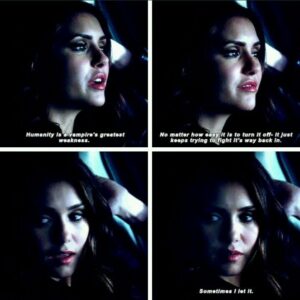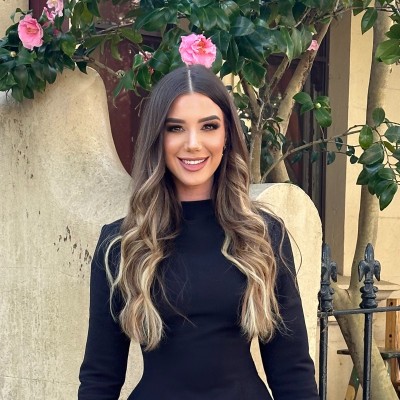Have you ever wondered what makes the television bad boy so appealing? Is it their charm? Their humour? Their demeanour? Or do they just have really, really dreamy eyes? And no, I’m not talking about Grease’s Rydell High stud Danny Zuko, nor am I referring to Gossip Girl’s notorious ladies man, Chuck Bass. I’m talking about actual killers, who we (somehow despite all the death and destruction caused at their hands), root for to succeed.

These characters have something alluring about them that captivates and intrigues us. We then begin to ship them being with other (often innocent) characters in their respective movies and TV shows. We start to think the two totally different personalities are an amazing match.

TVD is an eight-season series based around the life of two vampire brothers: Damon Salvatore (Ian Somerhalder) and Stefan Salvatore (Paul Wesley).
The two characters are painted in a redeeming, humanised light, even though the two heartthrob vamps bite off more than they can chew (literally, they’re killers who have been known to bite people’s heads off).
As the series continues, we find more about their life and their backstories, and we even learn they’ve killed thousands of people combined! But guess what? We idolise them anyway.
So what is it that all our fave killers have in common to make us feel sympathy towards them?
The writers humanise them.
Who doesn’t love a bad boy with a soft side? Often the writers will play on our tendency to forgive by showing us the killer’s humanity. Whether it’s via Damon Salvatore’s banter and love for Katherine Pierce and Elena Gilbert (Nina Dobrev) in TVD, or through psychotic mass-murderer Klaus Michaelson’s fatherly concern for his daughter in The Originals. Once a character’s redeeming qualities are revealed to us, we tend to overlook their not so appealing ones.

It’s quite clever when you think about it. We find these characters more appealing because they have a reckless and highly dangerous side (although if we crossed them IRL we would run a mile).
However, these characters try to be better in their quest for redemption. If their ability to show authentic human emotions of love, hope, and kindness is shown, we will be more likely to adore them ourselves, and the writers know this.
We may also notice that other characters (who are often better natured) start to build up a relationship with the ‘bad guys’, which increases our own positive perception of these characters.
It’s not just men, though. Female killers on TV can have this bad-ass vibe too. Take Katherine Pierce and Rebekah Mikaelson in TVD. Both characters have killed many innocent people, yet as viewers, we still are sympathetic towards them when we see their vulnerable side.

The killers also possess undeniable charm.
Producers and directors will always look for someone who can tick all their boxes, and almost always, the loveable psycho killer must be attractive to the average eye.

I mean come on, of course casting Zac Efron in anything is already going to intrigue us. Via YouTube
As shallow as it may seem, think about it – as well as the potentially cheeky, witty or intelligent parts of their personality, if these characters didn’t give off some sort of charm or physical attractiveness, wouldn’t we just find them plain old creepy?
Which brings me to my next observation…
There’s always a love interest.
In TVD, Damon and Stefan originally have innocent Elena, Klaus has his sweet Caroline, and in American Horror Story, Tate Langdon has Violet Harmon.
See a pattern here? Each character has someone in their lives who show their vulnerability when it comes to love, and as a result, you guessed it! The sympathy card is played, and we want them to find success in their relationship.
They can be hero figures, too.
Marvel and DC fans, don’t attack me for saying this… but the heroes in a lot of these movies and TV shows are no stranger to death and destruction of their own making. Take the Marvel character Captain America (Chris Evans).
A fan who admits he ‘watches entirely too many Marvel movies’ posted this on Quora: “In The Avengers, Cap takes out multiple Chitauri. He also gets into a shootout with one of Loki’s operatives on the Heli carrier, and he fires repeatedly at the dude with an assault rifle… without batting an eye. In Civil War, he throws Crossbone’s men around like they’re nothing. Many of them slam into walls and vehicles and such and are most likely not getting up again.”

While yeah, killing the bad guy results in bringing peace and justice to the wider community in the Marvel Universe, there’s no escaping from the fact murderous acts have been committed.
But hey… it’s only TV, right? Well, no.
I think our blind adoration for these characters has the potential to go deeper than that. What if, in extreme cases, the idolisation of the ‘wrong’ characters filter down into our personal lives? Some people may be more inclined to fall for the ‘bad boy’ image or may begin to find toxic behaviour more acceptable generally.
Obviously, most people in the world wouldn’t knowingly date a killer, but many innocent characters in these TV shows often end up with the ‘reformed’ killers, which can set a standard that it’s okay for us to date those with questionable morals.
So you tell us – do the sympathetic tendencies towards the killer open a whole new conversation about pop culture’s psychological (and often subconscious) effect on their viewership? Let us know in the comments below!


